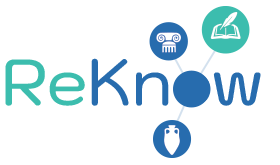ReKnow - Research Knowledge Documentation, Analysis and Exploration in Empirical and Descriptive Sciences
Descriptive and empirical sciences, such as History, are the sciences that collect, observe and describe phenomena in order to explain them and draw interpretative conclusions about their behaviour and their relationships under given circumstances. Researchers in these sciences usually encounter problems related to the integration of data coming from different sources, the epistemological adaptation and refinement of their research under specific circumstances, and the usability of their data analysis methods and tools. The ReKnow project aims to support researchers in better handling these problems by providing models, algorithms and tools that allow for better documentation, analysis and exploration of research processes and data.
Aim and Objectives
The ReKnow project aims to support researchers and domain experts in descriptive and empirical sciences in their research practices through solutions that allow for better documentation, analysis and exploration of research processes and data.
Objectives:
Models
Design and development of semantic data models and processes, based on international standards like CIDOC-CRM (ISO 21127:2014), for documenting, formally representing and interconnecting research data and processes.
Algorithms
Development of methods and algorithms for supporting argumentation processes and the discovery or revision of research knowledge.
Tools
Design and development of user-friendly and interactive tools for supporting advanced exploration and quantitative analysis of research data by domain experts.
Research Questions
To achieve the project objectives, several research questions need to be answered, including:
- How to catalog original research, documentation and analysis data, as a primary source of facts for research in descriptive and empirical sciences?
- How to formally represent and store data related to hypothesis building, relation making, as well as observation, argumentation, evidential reasoning and knowledge inference, in order to facilitate the detection and documentation of knowledge inconsistencies?
- How to maintain easy to explore connections to the provenance and source the gathered facts, in order to control errors, reliability, precision and comparability of facts from different sources?
- How to enable domain experts to explore the facts and express complex questions in an intuitive way?
- How to support efficient quantitative (statistical) analysis and interpretation of the gathered facts?
Use Cases
ReKnow relies on two real use cases and data coming from corresponding research projects:
- Maritime History, by exploiting data and domain knowledge from the SeaLit project (ERC Starting Grant, No 714437). SeaLiT studies the transition from sail to steam navigation and its effects on seafaring populations in the Mediterranean and the Black Sea (1850s - 1920s).
- History of Art, by exploiting data and domain knowledge from the RICONTRANS project (ERC Consolidator Grant, No 818791). RICONTRANS investigates the transnational phenomenon of artefact transfer and the various aspects of the reception of these objects in the host societies, focusing on the Russian religious artefacts brought to the Balkans the period 16th-20th centuries.
Project information:
- Start date: 1 June 2020
- End date: 30 November 2022
- Funded under: H2020-MSCA-IF-2019 (Marie Skłodowska-Curie Individual Fellowship)
- Grant agreement ID: 890861
- Coordinated by: Centre for Cultural Informatics / Information Systems Laboratory, Foundation for Research and Technology - Institute of Computer Science (Heraklion, Greece)



